PPC Search Marketing: A Comprehensive Guide
Pay-Per-Click (PPC) search marketing is a powerful digital advertising strategy that allows businesses to drive targeted traffic to their websites by paying for ad placements on search engine results pages. In this guide, we will explore the key components of PPC search marketing and how businesses can leverage this strategy to increase their online visibility and drive conversions.
How Does PPC Search Marketing Work?
In PPC search marketing, advertisers bid on specific keywords relevant to their target audience. When users search for these keywords on search engines like Google or Bing, the ads of the highest bidders are displayed at the top of the search results page. Advertisers only pay when users click on their ads, hence the name “pay-per-click.”
The Benefits of PPC Search Marketing
- Targeted Reach: PPC allows businesses to target their ads to specific geographic locations, demographics, and user interests, ensuring that their message reaches the right audience.
- Immediate Results: Unlike organic SEO efforts that take time to yield results, PPC campaigns can drive immediate traffic to a website and generate leads or sales in a short period.
- Measurable ROI: PPC platforms provide detailed analytics that allow advertisers to track the performance of their campaigns in real-time and adjust strategies accordingly to maximise return on investment.
Tips for Successful PPC Campaigns
- Keyword Research: Conduct thorough keyword research to identify high-converting keywords relevant to your business and target audience.
- Compelling Ad Copy: Create engaging ad copy that highlights your unique selling points and encourages users to click on your ads.
- Landing Page Optimization: Ensure that your landing pages are well-designed, relevant to your ad content, and optimised for conversions.
- A/B Testing: Test different ad creatives, landing page designs, and targeting options to identify what works best for your campaign objectives.
In conclusion, PPC search marketing is a valuable tool for businesses looking to boost their online visibility and drive targeted traffic to their websites. By understanding how PPC works and implementing best practices in campaign management, businesses can maximise the effectiveness of their digital advertising efforts and achieve measurable results.
Top 8 FAQs About PPC Search Marketing: A Comprehensive Guide
- What is PPC search marketing?
- How does PPC advertising differ from organic SEO?
- What are the benefits of using PPC for search marketing?
- How do I choose the right keywords for my PPC campaigns?
- What is a good budget for starting a PPC campaign?
- How can I measure the success of my PPC campaigns?
- What are common mistakes to avoid in PPC search marketing?
- Are there any tools or platforms that can help with managing PPC campaigns effectively?
What is PPC search marketing?
PPC search marketing, also known as Pay-Per-Click search marketing, is a digital advertising strategy where businesses bid on specific keywords to have their ads displayed at the top of search engine results pages. When users search for these keywords, the ads of the highest bidders appear prominently, and advertisers only pay when users click on their ads. This targeted approach allows businesses to reach their desired audience effectively and drive traffic to their websites. PPC search marketing is a cost-effective way to increase online visibility, generate leads, and boost conversions by placing relevant ads in front of potential customers actively searching for products or services related to the keywords bid on by advertisers.
How does PPC advertising differ from organic SEO?
PPC advertising and organic SEO are two distinct digital marketing strategies that businesses often utilise to increase online visibility and drive traffic to their websites. The main difference between PPC advertising and organic SEO lies in how traffic is generated. With PPC advertising, businesses pay for ad placements on search engine results pages and only pay when users click on their ads. On the other hand, organic SEO focuses on improving a website’s visibility in search engine results through optimisation techniques such as keyword research, content creation, and link building, without paying for ad placements. While PPC offers immediate results and precise targeting options, organic SEO provides long-term sustainability and credibility in search engine rankings. Ultimately, businesses can benefit from using both strategies in conjunction to maximise their online presence and reach a broader audience effectively.
What are the benefits of using PPC for search marketing?
When it comes to PPC search marketing, the benefits of using Pay-Per-Click advertising are numerous. One of the key advantages is the ability to target specific audiences based on keywords, demographics, and interests, ensuring that your ads reach the right people at the right time. Additionally, PPC campaigns can deliver immediate results by driving traffic to your website and generating leads or sales quickly. The measurable ROI provided by PPC platforms allows advertisers to track campaign performance in real-time and make data-driven decisions to optimise their strategies for maximum effectiveness. Overall, utilising PPC for search marketing offers businesses a cost-effective way to increase online visibility, drive targeted traffic, and achieve tangible results in a competitive digital landscape.
How do I choose the right keywords for my PPC campaigns?
Choosing the right keywords for your PPC campaigns is crucial to the success of your digital advertising efforts. Start by conducting thorough keyword research to identify relevant terms that align with your business goals and target audience. Consider using a mix of broad, exact match, and long-tail keywords to reach a wider range of potential customers. Analyse the search volume, competition level, and cost-per-click for each keyword to determine its effectiveness in driving traffic and conversions. Additionally, leverage keyword tools provided by PPC platforms like Google Ads to discover new keyword opportunities and refine your campaign strategy. Regularly monitor and adjust your keyword selection based on performance data to ensure optimal results for your PPC campaigns.
What is a good budget for starting a PPC campaign?
Determining a suitable budget for starting a PPC campaign is a common concern among businesses venturing into search marketing. While there is no one-size-fits-all answer to this question, it is essential to consider various factors such as industry competitiveness, target audience size, and campaign objectives. A good practice is to start with a budget that allows for testing and optimisation while ensuring sufficient visibility and reach. It’s advisable to monitor the campaign performance closely and adjust the budget based on the results to achieve the desired outcomes effectively.
How can I measure the success of my PPC campaigns?
Measuring the success of your PPC campaigns is crucial for evaluating their effectiveness and optimising performance. Key metrics to consider include click-through rate (CTR), conversion rate, cost per acquisition (CPA), return on ad spend (ROAS), and overall return on investment (ROI). By tracking these metrics using tools like Google Analytics or the platform’s built-in reporting features, you can gain valuable insights into how well your campaigns are performing and make data-driven decisions to improve results. Regularly monitoring and analysing these metrics will help you identify areas for improvement, refine your targeting strategies, and maximise the impact of your PPC efforts.
What are common mistakes to avoid in PPC search marketing?
When it comes to PPC search marketing, avoiding common mistakes can make a significant difference in the success of your campaigns. One frequent mistake to avoid is neglecting keyword research and selection. Choosing irrelevant or overly competitive keywords can result in wasted ad spend and poor campaign performance. Another common error is overlooking ad copy quality and relevance to the landing page, which can impact click-through rates and conversions. Additionally, failing to monitor and adjust bids, budgets, and targeting settings regularly can lead to missed opportunities for optimisation and cost-efficiency. By being mindful of these common pitfalls and implementing best practices in PPC search marketing, businesses can enhance their campaign effectiveness and achieve better results.
Are there any tools or platforms that can help with managing PPC campaigns effectively?
When it comes to managing PPC campaigns effectively, there are several tools and platforms available to help streamline the process and maximise results. Popular tools such as Google Ads Editor, Microsoft Advertising Editor, and third-party platforms like SEMrush and WordStream offer features that enable advertisers to efficiently create, monitor, and optimise their PPC campaigns. These tools provide functionalities such as keyword research, ad creation, bid management, performance tracking, and A/B testing, making it easier for businesses to manage their PPC campaigns effectively and achieve their advertising goals. By leveraging these tools and platforms, advertisers can save time, improve campaign performance, and ultimately drive better results from their PPC efforts.




